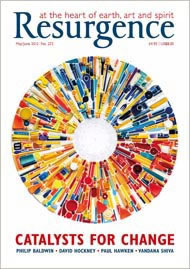Geoff Mead tells us that we humans are “storytelling creatures”, that we are “swimming in a sea of stories” at home, at work, in every aspect of our lives. But stories are not just tales that end in ‘happily ever after’, and storytelling is not just a set of techniques. Story and storytelling is a discipline, a commitment, a way of being that can “engage our imaginations, heal our wounded souls, bring people together in community, enable us to make sense of the world around us, and bring adventure into our lives”.
Geoff is fascinated by stories from different traditions and believes stories are not just entertainment but communicate on a deeper, soul level. We all construct our sense of who we are through our personal stories, and by finding different ways to tell these we can generate ‘healing fictions’.
The author shows how, by recounting his own story in the form of a myth, he was able to re-imagine his sense of who he was. “By weaving particular events from my life into story form, I gave them new meaning and new imaginative possibilities.” This process of ‘storying’ one’s life can be applied in a wide range of settings, including working with men, masculinity and fathering, in community, education and other organisations.
Coming Home to Story is not so much a ‘how to’ book as an inspiration and appreciation of the possibilities oral storytelling offers. It is in part a personal memoir, telling how Geoff discovered story and how he learned, quite painfully, to develop the craft of storytelling. The techniques are the easy part, he tells us; developing the craft is a lifelong journey. The storyteller’s job is to let go of self-importance and serve the story.
I have known Geoff for many years, first as a doctoral student, now as a friend and colleague. When I first knew him he was still a senior police officer working at the Police Staff College and with the Hertfordshire constabulary. Even then he used story, once telling the traditional Lakota tale of Jumping Mouse to invite civilians and officers in the service to explore different forms of leadership.
Storytelling in formal organisations can stimulate imagination, open up conversations, and move people beyond the clichés of business life. It can help leaders connect better with their staff and link senior civil servants with the public they serve. Geoff writes how he enjoys “sprinkling the water of human stories on the sometimes parched landscapes of our organisations”.
This is a lively book, full of anecdotes and illustrations drawn from his experience. It is also informed by important ideas – for example, the distinction made by the psychologist Jerome Bruner between rational and storied modes of thought; and the formal theory of philosopher Jürgen Habermas that argues that story in all its forms is a means of reconnecting our everyday human lives with the vast and complex systems of which we are a part.
This book is the first publication of the Vala Publishing Cooperative, a pioneer in cooperative publishing. Vala was a character in William Blake’s mythology, representing the natural world. In drawing on this mythological name, the co-op harks back to Blake’s revolutionary spirit and the powerful energy of the grounded feminine, aiming to counter the standardisation and commercialisation of the publishing industry. (In the interests of full disclosure, I acknowledge that I am an investing member of the co-op.) Vala brings together people concerned to develop models of responsible business and book publishing professionals in an open and cooperative relationship. The aim is to produce books that explore diverse and expansive ways of thinking and being, and honour our human potential.
For more on Vala Publishing Co-operative visit www.valapublishers.coop






